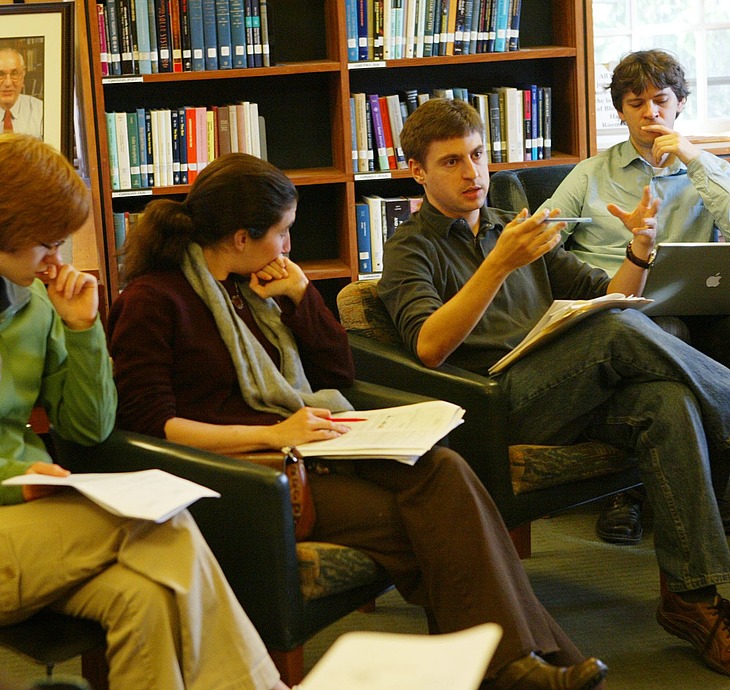
Astrophysics Research Interests
Faculty
- Professor James Stone: Astrophysical gas dynamics; star and planet formation, accretion flows, interstellar gas dynamics. Numerical algorithms for magneto-hydrodynamics and radiation hydrodynamics
- Professor Matias Zaldarriaga: Cosmology -- early universe cosmology, cosmological perturbation theory, cosmic microwave background, large-scale structure, dark matter and dark energy
Current Members
- Uddipan Banik: galactic dynamics, galaxy formation and evolution, dark matter, kinetic theory, and structure formation. While at IAS, Uddipan will conduct research on the relaxation of collisionless and weakly collisional systems, e.g., galaxies, (cold and self-interacting) dark matter halos, and collisionless plasma.
- Nianyi Chen: using numerical simulations to model the evolution of galaxies across cosmic time as well as the connection between massive black holes and their host galaxies. While at IAS, she will develop simulations for characterizing the observation signatures of such evolution through different probes and scales.
- Alexander Chernoglazov: high-energy astrophysics; kinetic physics of plasmas and radiation mechanisms in the magnetospheres of compact objects (e.g., neutron stars and black holes). While at IAS, I will work on explaining the thermal X-ray emissions from the surfaces of pulsars and the dynamics of pulsar wind nebulae.
- Mark Ho-Yeuk Cheung: a gravitational-wave astrophysicist. His interests include binary compact-object mergers, black hole physics, gravitational-wave lensing, and tests of general relativity.
- Carolina Cuesta-Lazaro: works at the intersection of cosmology and machine learning. While at IAS she will research how generative models can bridge the gap between cosmological simulations and observations, developing methods to identify missing physics in simulators and detect deviations from ΛCDM.
- Biwei Dai: developing and applying physics-motivated machine learning models to learn the fundamental properties of the universe from large-scale structure datasets. He currently works on the data analysis of weak gravitational lensing at the field level.
- Alexander Dittmann: theoretical and computational astrophysics. His research often focuses on the interactions between binary systems and their accretion disks, and using X-ray observations of neutron stars to glean insight into the nature of matter at supranuclear densities.
- Callum Fairbairn: the nonlinear dynamics of distorted astrophysical discs; protoplanetary gas-dust dynamics, planet formation processes and planet-disc interactions; disc instabilities; and debris discs.
- Jacob Fields: a computational astrophysicist with a background in modeling compact objects. He is particularly interested in several aspects of binary neutron star and black hole-neutron star mergers, including predicting observational signatures, exploring how different physical mechanisms (e.g., magnetohydrodynamic turbulence and instabilities) contribute to these signals, and developing improved numerical methods.
- Chris Hamilton: dynamics of galaxies, globular clusters, binary stars, and planetary systems; compact object mergers (LIGO/Virgo gravitational wave progenitors); and the kinetic theory of stellar systems and plasmas.
- Yue Hu: ubiquitous turbulence and magnetic fields in astrophysics, as well as their role in cosmic ray transport, star formation, and galaxy evolution. At IAS, Hu will explore and study the largest magnetic field in galaxy clusters.
- Nickolas Kokron: the formation of large-scale dark matter structures in the Universe and their connection to luminous tracers such as galaxies. He employs both numerical simulations and pen-and-paper theory in this study, with an emphasis on techniques that combine both paradigms.
- Andrew Mummery: the dynamics of material falling onto black holes through so-called "accretion disks". By modelling these systems in detail he uses astronomical observations and numerical simulations to learn more about the black holes in our Universe and the behaviour of fluids in extreme gravity.
- Javier Roulet: compact object astrophysics. To this end he develops algorithms for detecting gravitational waves from compact binary mergers, measuring their parameters and analyzing them collectively to characterize the astrophysical population.
- Mor Rozner: planet formation, stellar and planetary dynamics, and gravitational wave sources.
- Gabriela Sato-Polito: connecting new observations of the most elusive corners of the Universe with tests of fundamental physics. Her recent work explores techniques to map the matter distribution in the distant Universe, and measurements of gravitational waves by precisely timing pulsars.
- Nadine Soliman: the interplay between microphysical processes and large-scale astrophysical structures, with a focus on star and planet formation, galactic dynamics, and plasma physics. As a Hubble Fellow, Soliman will refine star formation simulations to capture the multiscale processes governing the collapse of molecular clouds, the birth of stellar clusters, and the formation of protoplanetary disks, aiming to uncover the fundamental mechanisms that drive star and planet formation.
- Giovanni Maria Tomaselli: theoretical and astrophysical aspects of black holes, gravitational waves, and dark matter. His research has explored signatures of new ultralight particles in black hole binary inspirals.
- David Velasco-Romero: focuses on developing and adapting high-order numerical methods for astrophysical simulations, particularly in the areas of magneto-hydrodynamics (MHD) and planet-disk interactions; simulating planet-disk interactions with a particular emphasis on the thermal feedback between planets and the surrounding disk by incorporating multi-fluid dynamics and high-resolution techniques to model dust accretion and planetary migration; high-performance computing techniques, including GPU acceleration and parallelization, to tackle complex astrophysical problems.
- George Wong: numerical methods and analytic modeling to study high-energy astrophysical phenomena, and especially accretion onto supermassive black holes. He is interested in predicting observational signatures of the connection between black holes and relativistic jets as might be observed by next-generation experiments.

